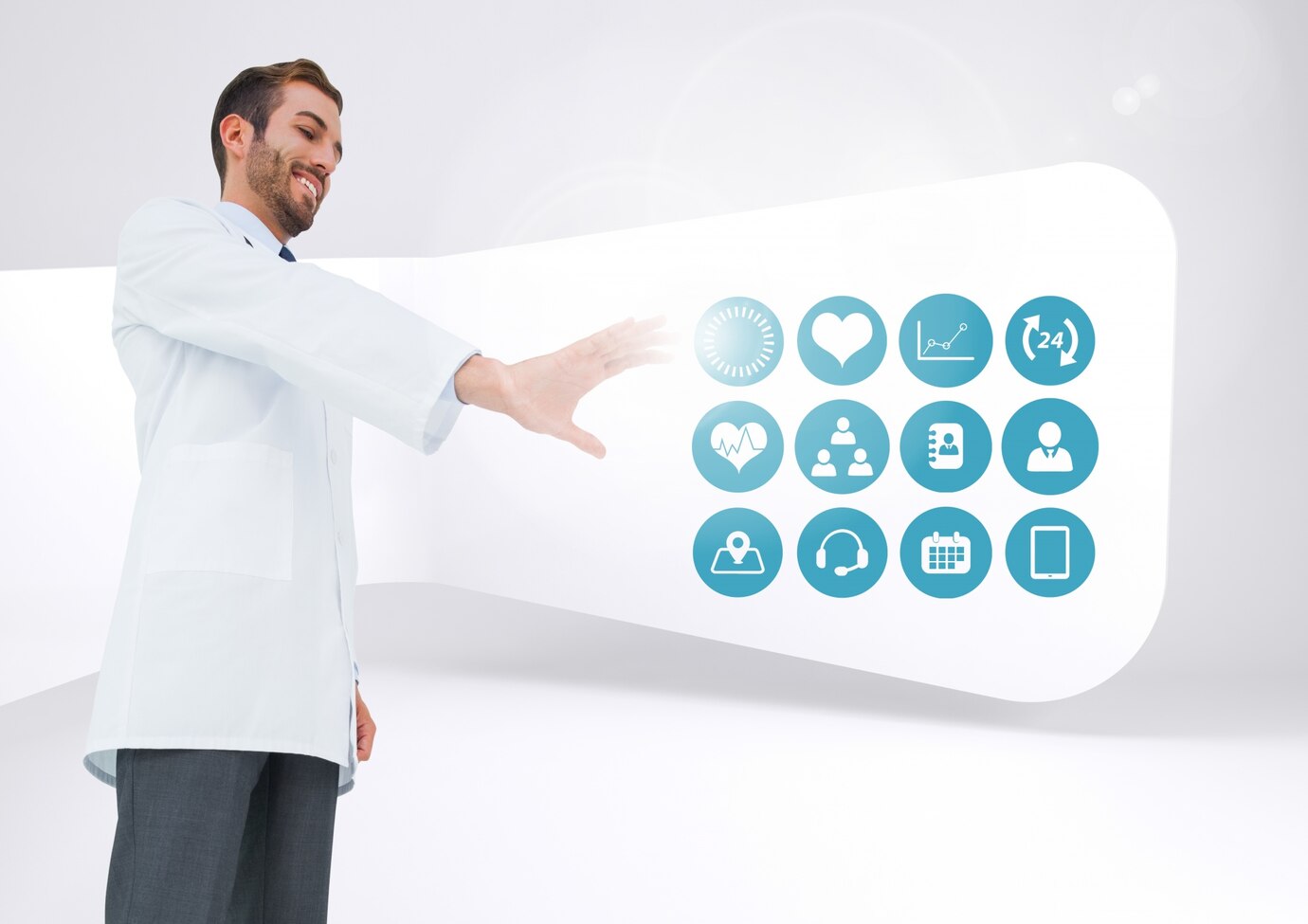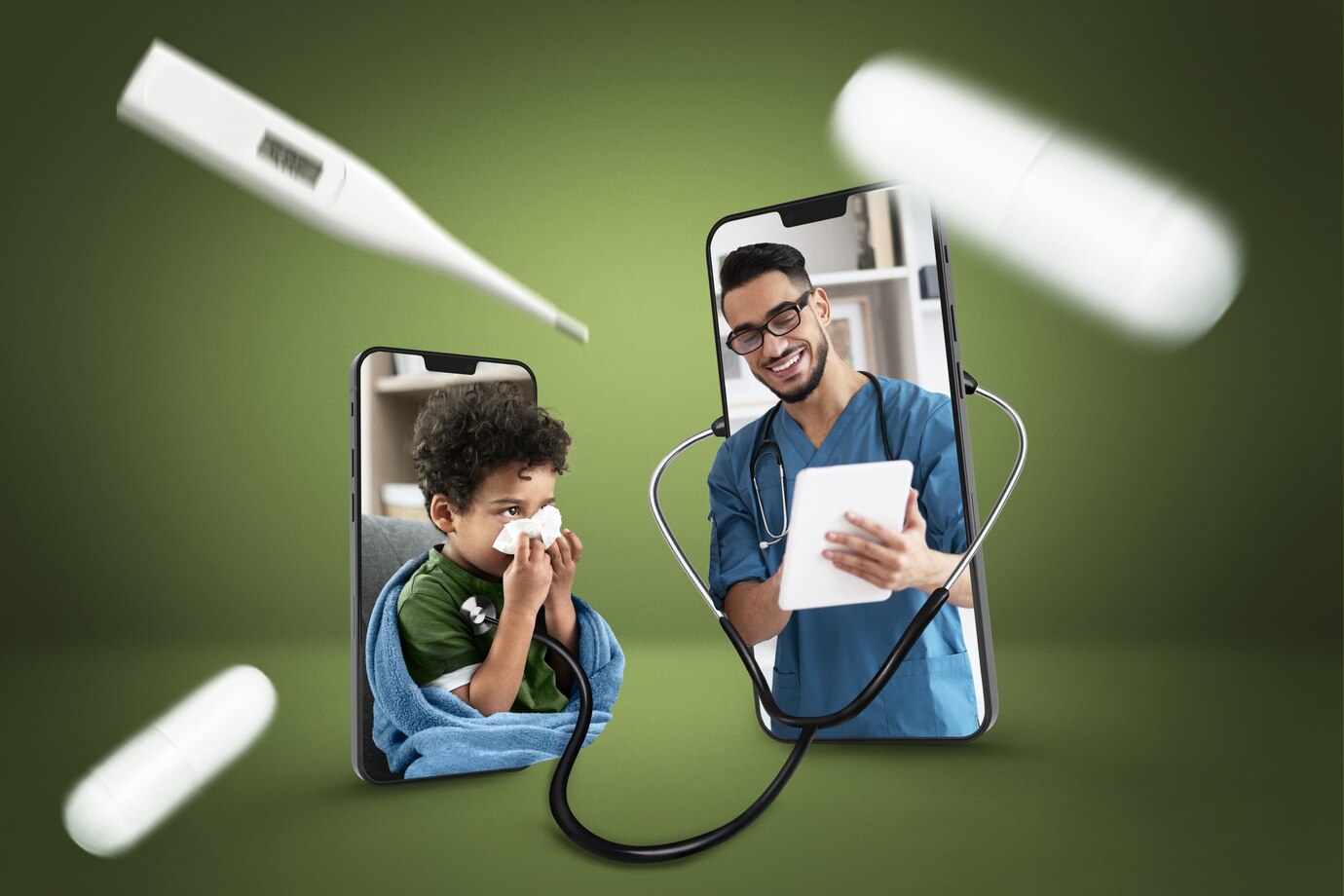Blog Detail
- Home
- Blog Detail

- March 20, 2025
How Social Media is Changing the Healthcare Industry
The impact of social media marketing in the healthcare industry is undeniable. Studies show that 57% of patients are influenced by a hospital’s social media presence when choosing a healthcare provider, while 81% believe a strong social media strategy signals advanced technology and high-quality care.
However, navigating the world of healthcare marketing isn’t just about engaging content—it also involves ensuring compliance with strict regulations like HIPAA. Striking the right balance between visibility and compliance is key to success.
Keep reading to discover why social media marketing in the healthcare industry is a game-changer in 2025. We’ll break down the latest trends, strategies, and industry-specific data to help you elevate your healthcare brand’s online presence.
The Benefits of Social Media Marketing in the Healthcare Industry

Social media has transformed the way healthcare organizations connect with patients, build trust, and share valuable medical information. As more consumers turn to digital platforms for health-related guidance, leveraging social media marketing in the healthcare industry has become a necessity. From increasing brand awareness to improving patient engagement, social media offers numerous benefits for medical institutions and professionals alike.
Build a Positive Brand Image
Unlike traditional brands such as Coca-Cola or Nike, healthcare organizations often struggle with brand recognition. However, trust is the foundation of every provider-patient relationship. Social media allows healthcare brands to demonstrate their values, showcase patient success stories, and highlight community involvement.
By consistently sharing engaging content, healthcare organizations can establish credibility and connect with both potential patients and employees. For example, posting testimonials, behind-the-scenes hospital experiences, and staff highlights fosters a sense of trust and transparency.
Raise Public Awareness of Health Issues and Best Practices
Social media marketing in the healthcare industry plays a vital role in public health education. Government agencies, hospitals, and private healthcare providers can use platforms like Facebook, Instagram, and LinkedIn to disseminate essential health information.
Through engaging infographics, live Q&A sessions, and video explainers, healthcare organizations can:
- Educate the public about disease prevention and healthy living
- Share updates on new treatments and medical breakthroughs
- Provide emergency health alerts and safety tips
For B2B healthcare companies, social media also serves as a channel to promote products and services while contributing to overall health literacy.
Stay Updated With Industry Trends
Beyond promoting healthcare services, social media serves as a powerful tool for industry research. Staying informed about competitors and emerging medical trends helps healthcare organizations refine their marketing strategies.
Using social listening tools, such as Hootsuite, businesses can monitor keywords, track brand sentiment, and analyze discussions related to healthcare topics. This real-time data helps professionals stay ahead in a rapidly evolving industry and make informed decisions.
Identify Audience Knowledge Gaps
Understanding what the audience needs is crucial for effective content creation. Social media provides direct access to patient concerns, questions, and misconceptions.
Healthcare organizations can:
- Conduct polls to gauge interest in specific topics
- Respond to comments and messages to clarify medical information
- Use insights from social listening tools to tailor content to audience needs
By addressing knowledge gaps, medical professionals can provide educational content that corrects misinformation and fosters patient trust.
Boost Engagement and Interaction
An active social media presence encourages audience engagement. Increased interactions lead to better visibility, brand loyalty, and trust.
However, engagement also requires managing potential misinformation. Social listening tools can help filter comments, identify trending discussions, and address public concerns promptly. Platforms like Ochsner Health have successfully used social media to combat misinformation, leading to a 129% increase in engagement and a 5% rise in website traffic from social media referrals.
Support Hiring and Recruitment Efforts
Attracting top medical professionals is critical for healthcare organizations. Social media marketing in the healthcare industry can streamline recruitment efforts by:
- Running targeted ads for job openings
- Sharing employee testimonials and workplace culture content
- Pinning career-related posts to the top of social profiles
Consistent brand presence on social media ensures that healthcare institutions remain top-of-mind for job seekers and medical graduates.
Attract New Patients
Today, many consumers rely on social media to research healthcare providers before booking appointments. According to recent surveys, over 12.5% of healthcare organizations have successfully gained new patients through social media.
By maintaining an informative and engaging social presence, healthcare providers can:
- Improve visibility in local search results
- Share positive patient experiences
- Offer virtual consultations and online appointment scheduling
Best Social Media Practices in Healthcare Marketing
Posting Frequency
Consistency is key in social media marketing. Research shows that healthcare, pharmaceutical, and biotech organizations post on Instagram more frequently than any other platform, averaging 4.5 posts per week.
Average Engagement Rates
Wondering if your social media engagement is performing well? The healthcare industry benchmarks as of Q4 2024 are:
- LinkedIn: 2.8%
- Instagram: 1.6%
- X (Twitter): 1.3%
- Instagram Reels: 1.3%
- Facebook: 1.3%
Follower Growth Rate
Healthcare brands aiming to expand their audience should set realistic goals based on industry trends. As of Q4 2024, follower growth rates are:
- Instagram: 0.38%
- LinkedIn: 0.25%
- Facebook: 0.10
Regulations and Best Practices for Social Media in Healthcare

While social media marketing in the healthcare industry provides incredible opportunities, it also comes with regulatory challenges. Healthcare professionals and marketers must follow legal and ethical guidelines to ensure compliance and maintain public trust.
College and Regulatory Body Guidelines
Most healthcare professionals are governed by licensing or regulatory bodies that set guidelines for social media use. While not all rules are legally binding, failing to follow them could impact a provider’s ability to practice.
For example, the British Columbia College of Physicians and Surgeons explicitly outlines what doctors can and cannot do when communicating with the public, including on social media. Many of these guidelines align with federal and regional laws, so healthcare organizations should ensure they comply before posting any content.
Inappropriate Uses of Social Media in Healthcare
Sharing Patient Stories with Identifying Information
One of the biggest concerns in social media marketing for healthcare is patient privacy. Sharing patient stories without proper consent or identifying details is a direct violation of HIPAA regulations in the U.S. and similar laws worldwide.
Research on social media posts by healthcare professionals found that 2% of posts included a patient’s name. Additionally, in 32.1% of cases, family or friends could recognize the patient even if the post didn’t explicitly include identifying details. To avoid breaches, always obtain written consent before sharing patient-related content.
Negative or Biased Remarks
Even unintentional language can appear judgmental or biased. For instance, using outdated terminology for substance use disorders can alienate patients and contribute to stigma. The National Institutes of Health recommends using science-based, non-stigmatizing language when discussing health conditions. Applying this principle across all social media content ensures inclusivity and professionalism.
Unproven Medical Claims
Healthcare marketers must ensure all claims are backed by scientific evidence. Statements like “This treatment works for most patients” can be misleading unless supported by clinical data. The Federal Trade Commission (FTC) closely monitors healthcare marketing, and vague or exaggerated claims can lead to penalties. Always be prepared to provide credible sources if questioned about medical statements.
Misleading Advertisements
Healthcare advertisements are subject to stricter regulations than general consumer ads. Marketing messages must be clear, accurate, and free from deceptive wording or omissions. In the U.S., healthcare advertising is regulated by HIPAA, the Food and Drug Administration (FDA), and the FTC.
Healthcare marketers should reference regulatory guidelines such as:
- FTC: Health Products Compliance Guide
- FDA: Advertising and Promotion Guide
- Health Canada: Advice for Advertising Health Products
- The Canadian Code of Advertising Standards
The best platforms for healthcare social media marketing
Social media has transformed the way the healthcare industry connects with patients, professionals, and the community. With billions of users across different platforms, social media marketing in the healthcare industry has become an essential tool for hospitals, clinics, and healthcare providers to engage with their audience, share critical information, and build trust. Here’s how the major social media platforms can enhance your healthcare marketing strategy.
Facebook for Healthcare Marketing
Facebook remains the most widely used social media platform, making it a key component of any healthcare marketing strategy. It is an ideal platform for engaging with patients, providing updates, and establishing a sense of community.
How to Utilize Facebook for Healthcare Marketing:
- Share updates about hospital events, community outreach programs, and health fairs.
- Post reminders about seasonal illnesses, vaccinations, and health tips.
- Announce any construction or road closures that may impact patient visits.
- Use Facebook Live to host Q&A sessions with healthcare professionals.
Facebook serves as a primary reference point where patients and potential patients can easily find important updates about a hospital or clinic.
Twitter for Healthcare Marketing
Twitter is a fast-paced platform that is excellent for real-time updates, industry news, and quick engagement with the public. It allows healthcare organizations to share information instantly and connect with a broad audience.
How to Use Twitter for Healthcare Marketing:
- Post live updates on healthcare trends, medical breakthroughs, and research studies.
- Share articles featuring your hospital or healthcare professionals in the media.
- Highlight achievements, awards, and recognition received by the hospital staff.
- Engage with patients by answering questions or responding to comments.
Twitter is an effective tool for staying relevant in healthcare conversations and positioning your organization as a thought leader in the industry.
LinkedIn for Healthcare Marketing
LinkedIn is a professional networking platform where hospitals and healthcare organizations can establish credibility, share insights, and connect with industry experts. It is less about patient engagement and more about building authority and fostering professional relationships.
How to Utilize LinkedIn for Healthcare Marketing:
- Publish articles on healthcare trends, research, and innovations.
- Participate in industry discussions and contribute to thought leadership.
- Network with other healthcare professionals, hospitals, and organizations.
- Share job openings, fellowship programs, and training opportunities.
LinkedIn is an essential platform for reinforcing your hospital’s reputation as a leader in healthcare advancements and research.
YouTube for Healthcare Marketing
YouTube, the world’s largest video-sharing platform, offers healthcare organizations the opportunity to engage with audiences through informative and visual content. Video marketing is highly effective for educating patients and increasing brand awareness.
How to Use YouTube for Healthcare Marketing:
- Create educational videos explaining medical procedures, treatments, and healthcare services.
- Share patient testimonials and success stories to build trust and credibility.
- Provide virtual hospital tours to familiarize patients with your facility.
- Post instructional videos about hospital policies and check-in procedures.
YouTube helps healthcare organizations create an engaging experience for patients by offering valuable and easily digestible content.
Need Help with Healthcare Social Media Marketing?
If you need help building and managing a professional healthcare social media marketing strategy, Copulaglobal can assist. Our healthcare digital marketing agency has helped healthcare companies like yours build better social media accounts, update them regularly, and attract new patients.
We specialize in crafting customized strategies that align with your hospital’s goals, ensuring that your social media presence remains engaging, informative, and effective. Whether you need assistance with content creation, platform management, or patient engagement, our team is here to help.
If you want to see how well social media can work for your hospital, feel free to reach out to us for a free consultation and custom quote. We’d love to hear from you!
